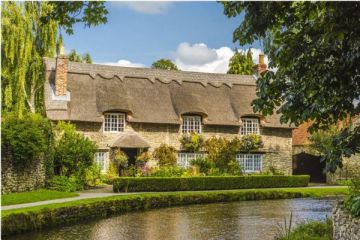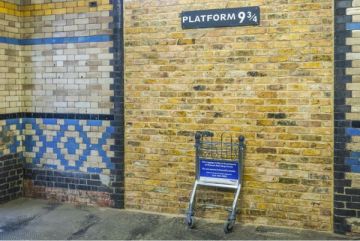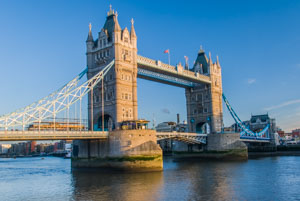by Pam Mather
Note: This guide was written in the fall of 1998 for a friend who was going to live in London on the BUNAC program. Therefore, some of the information will be outdated.
Getting Started
Arriving in London via Heathrow
It seems as if most flights from America arrive in London at some ungodly hour - usually around 6 a.m. Since that is bedtime back home, you will almost certainly be exhausted upon arrival unless you plan ahead. Sleep on the plane, whatever it takes. Generally, you will get a goody bag with a sleep mask and fuzzy socks. Slip these on, take a Sominex, and snooze away.
Upon arrival, you will stand in a massive queue for passport control. Have your passport out and BUNAC-issued blue card (if applicable) and bank statement. If you are going to the UK for work, make sure they see your blue card and stamp your passport accordingly. Otherwise, you will be standing in a much, much longer line at the Home Office, a train ride away, to remedy the situation. (I should know, it happened to Kristina.)
They will ask you several questions. Just answer them honestly, and you shouldn’t have any problem. When you have finally cleared customs and have gotten your luggage, it will be time to make it into London. Before you even leave the airport, withdraw some cash from one of the many cash machines. Decide if you want to make it into the city in 15 minutes or 50, and act accordingly.
The Heathrow Express, a brand new train line that runs every 15 minutes to Paddington Station, is a godsend. However, it costs £10, and if you aren’t staying anywhere on the near Paddington, it might be more trouble than itÃs worth, lugging your bags up and down flights of stairs in tube stations while the natives swarm around you and push into you and...you get the idea.
If you are staying somewhere on the Piccadilly line (Earl’s Court is full of hostels, and you just might find yourself staying there), take the Underground into the city. It takes far longer, but after all, you will have a seat (it’s the first stop on the line), and itÃs only around £6. Do not, under any circumstances take a taxi, because it will cost you around £60 to get into the city, and it’s just not worth it.
BUNAC orientation
Upon arrival, with in a day or two, you will need to attend the BUNAC orientation. Here you will receive information on what you will have to do when finding a job, moving into a flat, and generally getting started. It lasts a few hours, and is required before you can use the accommodation and employment boards.
How can BUNAC help?
The BUNAC office can answer most questions you may have regarding regulations and whatever you might have a question about. If you go to the office, be sure to bring your blue card, because you will need it to get into the inner room with all the boards, phones, and directories.
The BUNAC office also provides mailboxes for you to receive mail, but once you move into your own place, you will want to tell everyone your new address, since getting to the BUNAC office can be a bit of a pain.
Finding a temporary home
Hostels
Most hostels seem to be located in Earl’s Court because it is a largely Australian area and there are a lot of young Australians working in London or just passing through.
Dorms
If you will be arriving in the summertime, a university dorm is an excellent option. They are generally clean and well-kept (after all, students have to live in them the rest of the year) and can be far cheaper than hostels. The drawback is that most of them are in the Bloomsbury/Euston areas, which are not the best areas to flat-hunt, so you may find the location inconvenient.
Finding a place to live
Finding a flat is a necessary evil, but in order to do so efficiently, you should know a few things. It can be difficult to determine your budget before you have a job, so the first thing you need to do it find employment so that you can determine how much you can spend and what area will work best for you. You will find it difficult to look nice enough for a job interview while living in a hostel, but try.
The area you live in depends not only on where you work but also on how much you want to spend on transportation costs. It is generally cheaper to live in one of the outer zones of the London Transport system (anything outside of zone 2 will be in the suburbs), but consider the higher tube and bus fares you will pay monthly. In addition, keep in mind the costly minicab (if you can even find one that will take you that far out) ride back to your flat after a night out carousing in the West End. If you like to go into the city centre often, it is recommended that you live close to it. After all, you only live once. (Money, shmoney)
It is also generally safer in the city centre, depending on the area. Kensington or Chelsea are extremely safe, but also expensive. Less expensive, but also a bit less safe are the areas north of Hyde Park in Bayswater and Marble Arch. Areas like Camden are “cool,” but like most “cool” areas, it can be somewhat unsafe as well.
A good place to start with flat hunting is the classifieds. One of the best free magazines for this is called TNT. It is geared towards young Australians and New Zealanders, but is packed with ads for apartments all over the city.
The Evening Standard Tuesday edition is also a good place to look. In order to have any luck at all with their listings, though, you must get the paper early in the morning (6:00 a.m.) and start calling immediately. The Evening Standard is extremely popular, so remember the other thousands of flat-seekers just like you.
You may be tempted to use one of the many flat-finding services that are advertised in the newspapers and other property guides. Most of them will charge you a fee (around £50 and up) either upon finding you a flat to look at or to rent. It is advisable to check their policy thoroughly before forking over money that could go towards your deposit or rent. Often an agency will charge you just for setting up a few appointments, and from experience, I can tell you that the flats one agency sent us to were tiny, cramped and fly-infested.
Once you do find a flat, be sure to keep a receipt from your security deposit. Also, make a list of any damages you see and have the landlord or lady sign it so that you can be sure to get back your deposit when you leave. (You might just need it for a taxi back to the airport!)
Types of accommodations
When looking for a place to live, you may find yourself confused by all of the different types of accommodation you find listed in the newspaper. The main kinds are flats, bedsits and flat shares. You may also find yourself living in a room supplied by your job (most commonly with pub jobs.)
Flats
Flats are self-contained apartments, like traditional American apartments. They have their own kitchen, bathroom, and at least one other room. Our first flat had only a combination living room-bedroom, but our second had a separate bedroom. These kinds of accommodation are the most expensive, but if you are with several people, you should be able to afford a decent one. Make sure you rent a flat that is furnished, and take note of what kind of housewares you may need to purchase.
Bedsits
Bedsits are one room, with the “kitchen” generally consisting of a hot plate and sink. Of all the flats we looked at, bedsits were the grottiest, nastiest places you can find. But maybe we just looked in the wrong place. You will share a bathroom with several people, and you may even find yourself with only a tub in the shared bathroom, not even a shower. Proceed with caution. Good for one or two people, if you don’t mind possibly sharing a bed and if you aren’t making much money.
Flat shares
A flat share is ideal for single travellers. You meet new people in similar situations, and the rent is much cheaper than if you tried to pay for a flat all by yourself. Basically, you will be living in a room of a large house, sharing a kitchen and bathroom with the other tenants. This can be fun if you like your roommates, and hell if not. If you get a flat supplied with your job, it will most likely be a flat share arrangement.
Setting up your flat
Telephone
If you are lucky enough to find a flat with its own telephone, you may have to get it switched on. We experienced two vastly different telephone situations in our two flats. In the first, I merely had to call British Telecom (BT) to get the phone put in my name. It was that simple. In the second, they tried to demand all sorts of information about us, which we could not supply. In that case, our phone eventually ran out and we had to resort to using a mobile phone. You can rent these from many places. There were several such businesses on Edgware Road, but shop around.
Electricity
Electricity is usually paid for in your rent, or you can negotiate for it. Some flats have meters that you must purchase keys for. For example, you might go to the hardware store to purchase £5 worth of electricity (which should last a while), and then when that runs out, you purchase more.



